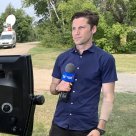The Saskatchewan Health Ministry says it is evaluating the use of cellphone data to track coronavirus exposures but has not committed to any such program.

In response to a request from Global News, a spokesperson said the health ministry is “currently assessing the information and experiences from multiple jurisdictions related to technology-based contact tracing programs and other applications that will assist in the COVID-19 response.”
The statement also said the ministry is establishing a process to review the many offers it has received from private vendors and researchers, always with privacy in mind. Tech giants Google and Apple are developing tracking programs in other locations, however, the ministry noted that it has not directly engaged with either company.
On April 10, the companies announced a joint effort to enable contact tracing using the Bluetooth capabilities on iPhones and Android devices. The program would entail developing “interoperability” between the two different platforms so that apps can be used on both kinds of devices.
Apps could then be developed by or for government health authorities that would allow for data on an infected person’s whereabouts to be collected.
The release noted user privacy and security were central to the design.
According to Saskatchewan information and privacy commissioner Ronald Kruzeniski, the program would be legal so long as the data adhered to certain guidelines.
He said organizations can work with “de-identified data,” which is stripped of identifying information and aggregate data.
Chris Parsons, a privacy and internet researcher with the Citizen Lab at the University of Toronto, said the program would only be effective if it is paired with the ability to test everyone that the data indicates is at risk.
“If we don’t have a lot of testing and we know that there’s a large number of asymptomatic people that are wandering around, really these apps are not going to be very helpful whatsoever,” he said.
Parsons also noted that the programs would add a new level of scrutiny.
He stressed that unconfirmed data diagnoses — people confirmed as “at risk” by the app whose status hasn’t been confirmed by medical tests — could face undue restrictions.
Parsons said this would exacerbate inequality because someone who may not be able to afford to miss work would be forced to do so without exposure or symptoms being confirmed by a medical professional.
There is also another complication: the data would go to a government medical authority, but the government body may not have the ability to create an app and would, therefore, need a third party do so. Parsons said the fact that someone’s health information would be in the hands of app developers — and that the quality of the apps would be regulated by Apple and Google — poses serious threats to privacy.
He also said the same about the scope of the program.
“It really does potentially facilitate broad-based tracking of populations for any reason the government may want, or private companies, for that matter,” Parsons said.
Parsons said the program had implications that need to be considered because while it might make sense during a pandemic, it still exposes the personal information of many people and could exacerbate societal divisions.
“If we do this badly, then it is going to massively disenfranchise the population of this society that is already disenfranchised,” he said. “And frankly, we can’t trade one crisis to accentuate another one.”
Questions about COVID-19? Here are some things you need to know:
Health officials caution against all international travel. Returning travellers are legally obligated to self-isolate for 14 days, beginning March 26, in case they develop symptoms and to prevent spreading the virus to others. Some provinces and territories have also implemented additional recommendations or enforcement measures to ensure those returning to the area self-isolate.
Symptoms can include fever, cough and difficulty breathing — very similar to a cold or flu. Some people can develop a more severe illness. People most at risk of this include older adults and people with severe chronic medical conditions like heart, lung or kidney disease. If you develop symptoms, contact public health authorities.
To prevent the virus from spreading, experts recommend frequent handwashing and coughing into your sleeve. They also recommend minimizing contact with others, staying home as much as possible and maintaining a distance of two metres from other people if you go out.
For full COVID-19 coverage from Global News, click here.



Comments